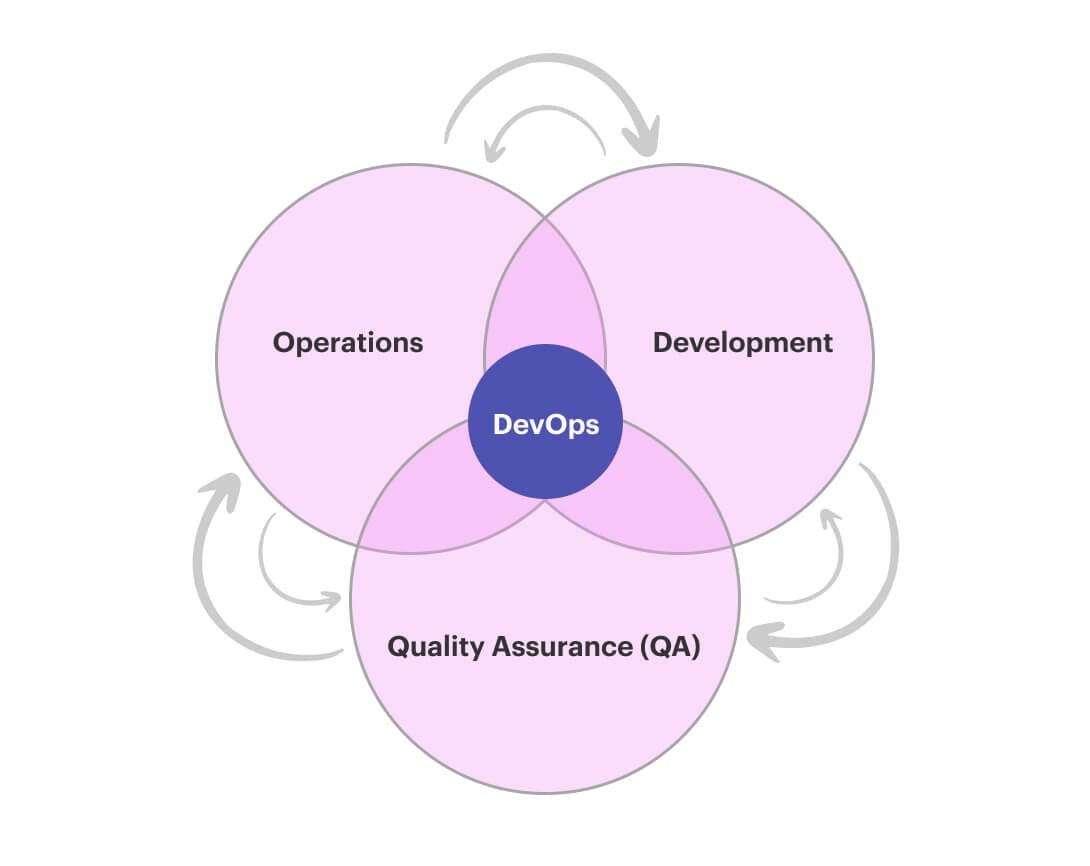Companies may use DevOps to speed up software development and release more reliable products. On the other hand, DevOps teams are very dynamic and demand personnel to account for various activities and responsibilities. Across today’s business sector, the DevOps paradigm is rapidly being used in all development and operational stages. This is due to two factors.
The first is to reduce software product time to market – DevOps engineers can speed up code positioning by 30 times! Second, the DevOps methodology allows faster feature additions, doubling the product’s success rate! As a result, there is a growing demand for DevOps engineers.
What is DevOps?

People always think about what is DevOps, what does DevOps mean, or what does DevOps do? DevOps, as demonstrated below, bridges the gap between development, IT operations, and quality assurance. DevOps is a group of methods that facilitate communication and collaboration between the teams.
DevOps strives to unify and automate daily tasks including software development, quality assurance, deployment, and integration. Teams build best practices and concepts that will shorten development cycles and help teams provide high-quality software consistently.
Who is a DevOps engineer?
Who is a DevOps engineer? This is a misunderstood term! People always use this term in other ways. In general, we can define this term as –
A DevOps engineer is an IT professional who oversees code releases and deployments in collaboration with software developers, system operators (SysOps), and other production IT workers. To encourage a collaborative and holistic atmosphere, the role requires someone with suitable hard and soft abilities to break conventional barriers between software development, QA, testing, and IT operations teams.
DevOps engineers must have a good understanding of typical system architecture, provisioning, administration, and traditional developer tools. Also, techniques like source control, giving and receiving code reviews, creating unit tests, and acquaintance with agile guides.
DevOps job roles and responsibilities
A DevOps engineer creates and implements software solutions in collaboration with many teams and departments. DevOps experts are skilled IT professionals who manage code releases in collaboration with software developers, quality assurance specialists, and IT employees.
DevOps engineers are in charge of managing IT infrastructure in accordance with the business requirements of code that can be deployed in a mixed multi-tenant environment and requires regular performance monitoring. DevOps engineers must be familiar with the development tools that are used to write new code or improve old code.
A DevOps engineer must collaborate with the team to address issues that arise throughout the coding or scripting process. It covers libraries and software development kits for running the software on diverse operating systems and for deployment.
Let’s see some of the major DevOps roles and responsibilities –
App planning, development, and testing
Application and infrastructure design, testing, and development are all handled by the DevOps team as a whole. Sharing the development and release pipeline responsibilities leads to better dependable services. Working in a DevOps team does not imply that you have a whole staff of “DevOps Engineers” — rather, a DevOps-oriented enterprise will distribute app development, testing, and release accountability across the whole IT organization and engineering department.
Documentation and system analysis
Documentation helps in writing server-side feature documentation and specifications. On the other hand, system analysis helps in examining the present technology and devises plans and processes for its enhancement and expansion. The DevOps engineer assists with immediate analytic requirements.
Execution of automation
As previously said, automation is a basic DevOps principle. As a result, it is evident that DevOps teams are responsible for implementing said automation. Everyone from the data team to the frontend team is responsible for automating tasks and increasing engineering and IT efficiency. You may focus more on strategic development and delivering corporate value by automating monotonous chores on a regular basis.
Development and project planning
IT solutions are developed, coded, built, installed, configured, and maintained by developers. DevOps engineers participate in project planning meetings to share their understanding of system options, risk, impact, and costs vs. benefits. DevOps engineers also discuss operational needs and development projections.
Maintaining CI/CD pipelines
As an associate of a DevOps team, you will be responsible for developing a CI/CD pipeline as well as optimizing procedures, tooling, and people. Engineers with a DevOps mindset will look for methods to enhance the pipeline on a continuous basis, i.e. from people to processes. Testing and QA will be moved further left in the development cycle, permitting the team to test continually without limiting pace.
Monitoring
Lastly, DevOps teams are in charge of putting actionable monitoring systems in place. The organization must collect data and understand how to use it effectively. The DevOps team is accountable for identifying blind spots in their applications and infrastructure, as well as determining how to monitor such services. Monitoring is simply one small step toward creating highly visible systems, but it’s a crucial first step toward constructing dependable systems.
Security compliance
Development and security operations have competing objectives, just like development and operations teams. Traditionally, development and operations teams focus on policy management, code inspection, and other tasks, while security teams monitor and remediate problems after the fact. Compliance, on the other hand, is now a necessity in every release cycle. As a result, security must be considered during the development planning stage.
Conclusion
The roles and responsibilities of a DevOps engineer are huge, but they incorporate the team’s technical skill sets. Shared ownership, on-call obligations, and accountability for a team’s underlying service are all part of a DevOps culture. Developers who have more exposure to the production systems they’re working on are better at producing code that works inside the system’s constraints. To provide more dependable releases, the IT team is better at leading developers and testers throughout the development lifecycle. If you are looking to hire DevOps engineers, then you must contact OpenXcell as they have the most skilled and experienced team of DevOps engineers.








